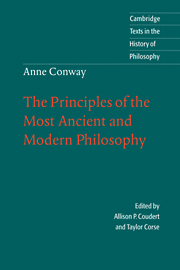Book contents
- Frontmatter
- Contents
- Acknowledgments
- Introduction
- Chronology
- Further reading
- Note on the text
- The Principles of the Most Ancient and Modern Philosophy
- Unpublished Preface by Henry More
- Published Preface
- Chapter I
- Chapter II
- Chapter III
- Chapter IV
- Chapter V
- Chapter VI
- Chapter VII
- Chapter VIII
- Chapter IX
- Index
- Cambridge Texts in the History of Philosophy
Chapter IX
Published online by Cambridge University Press: 18 November 2009
- Frontmatter
- Contents
- Acknowledgments
- Introduction
- Chronology
- Further reading
- Note on the text
- The Principles of the Most Ancient and Modern Philosophy
- Unpublished Preface by Henry More
- Published Preface
- Chapter I
- Chapter II
- Chapter III
- Chapter IV
- Chapter V
- Chapter VI
- Chapter VII
- Chapter VIII
- Chapter IX
- Index
- Cambridge Texts in the History of Philosophy
Summary
S. 1. Philosophers of every sort have laid a poor foundation for their philosophy, and therefore the entire structure must collapse. S. 2. The philosophy treated here is not Cartesian. S. 3. Nor is it the false philosophy of Hobbes and Spinoza, but diametrically opposed to them. S. 4. Those who up to now have tried to refute Hobbes and Spinoza have allowed them too much leeway. S. 5. This philosophy is the most efficacious for refuting Hobbes and Spinoza, but by a different method. S. 6. I understand something else by body and matter than what Hobbes understood, and this has never occurred to either Hobbes or Spinoza except, perhaps, in a dream. S. 7. Life is as really and properly an attribute of body as is shape. S. 8. Shape and life are different but not opposing attributes of one thing. S. 9. Mechanical motion and action or perfection of life distinguish things.
S. 1. From what has just been said, and for various reasons offered that spirit and body were originally one and the same in the first substance, it plainly appears that the so-called philosophers who have taught otherwise, both ancient and modern, have generally erred and laid a poor foundation from the beginning; and thus their entire house and building is so weak and, indeed, so useless that the whole edifice must collapse in time. From such an absurd foundation, many other most crass and dangerous errors have arisen, not only in philosophy but also in theology with great injury to the human race, to the detriment of true piety, and in contempt of the most glorious name of God, as will easily appear both from what has already been said and from what will be said in this chapter.
- Type
- Chapter
- Information
- Publisher: Cambridge University PressPrint publication year: 1996

